Friday Frivolity no. 18: 9 Places to Read, Rated
how our reading environments shape our reading, plus Virginia Woolf on how to read, and an Old English riddle
This is an installment in the section Friday Frivolity. Every Friday, you’ll get a short essay, plus a moodboard, 3 things I’m currently in love with, words of wisdom from what I’ve been reading lately, a little shimmer of poetry, a “beauty tip,” and a question to spark thought.
For this week’s post, the mood board and little essay are one and the same, kind of like what I did in this post from July. Also, since last Friday’s post was quite intense, I wanted to give you guys something lighter. I hope you enjoy!
—
9 Places to Read, Rated
When I read a book, and when I return to it, there is always engrained in my memory not only certain particulars of plot and character, word and phrase, the author’s style and tone and way of viewing the world, but also my own circumstances of reading. If I pick up Jane Eyre again, I always go back to those sunny summer afternoons I first read it as a teenager after long days of performing experiments with little tissues in a lab, waiting for my mother to pick me up. Goethe’s Elective Affinities always reminds me of a plane. I can’t separate Dickens’s Hard Times from lying in bed next to my father as a child.
These associations are where world meets word, where fiction and reality collide, where we see a book for what it really is: a portal. Sometimes page and place correspond and inform one another. When I went to New York last December, I was reading Lauren Elkins’s Flâneuse, in which she details some of her own experiences of walking around that city. I saw myself as part of a tradition of city-walkers, my walking linked with the walking of so many others, myself pawing back through the ghosts of eras past like Lucy in the wardrobe pushing aside old coats to reach Narnia.
Of all the places I love to read, the best is bed. Nothing is cozier, comfier, more suited to sailing off on the seas of the imagination. But books are thankfully portable, and there are many other places one might be found reading. Below are nine of them.
(left to right, top to bottom)
1. At a bookstall, with your nose glued to the pages — 2/10
Norman Rockwell, The Bookworm (Man with Nose in Book), 1926
This poor man. He is trying to bore a tunnel through the words with his nose. He is not just a bookworm, he is a bookmole. Reading like this would give me a headache. It seems almost as bad a reading experience as reading in a car (I’d give that a rating of 1/10–massive migraine guaranteed every time). Having all those other books and papers and ephemera—is that an umbrella?—tucked under the crook of my arm, sliding away, slipping out, inch by inch, with none of my hands free to catch the catastrophe, twists the knob of my anxiety all the way up to 11.
2. In a garden — 9/10
Henri Matisse, Woman Reading in a Garden, 1903
This is lovely. I can just imagine the light playing on the leaves, the scent of flowers rising up in a slow perfume, a beautiful summer breeze whispering through the leaves of trees, rustling the leaves of what I’m reading. What could be better than a long languid afternoon in nature, which is at one and the same time a long languid afternoon spent with one’s favorite author? The only reason this doesn’t get a 10/10 is the possibility of bugs.
3. Perusing a mystery novel on a train from San Francisco to New York before looking up from your book and witnessing a murder that lures you to get in contact with the novel’s author (whose skills in writing about crime you mistake for an ability to solve it) and eventually persuade him to not only leave his fiancée but marry you — 10/10
Deanna Durbin as Nicki Collins in Lady on a Train, 1945
What more is there to say? I think this is the apotheosis of fiction-reading. The reader dreams of nothing higher than for one’s favorite fictions to step off, suddenly, shockingly, magically, off the page and materialize around oneself, solid and real and sure, and for the beloved author of those fictions to love oneself back.
4. On a couch that matches the cover of your book, in front of a curtain that matches the cover of your book — 10/10
“The Spirit of England”: Vittoria Ceretti by Ellen von Unwerth for Harper’s Bazaar UK, April 2016
Do it for the aesthetic. A book should bleed from its pages and infect everything around it. The whole world should sing in concert with your book; this is what the poets meant when they said that Orpheus’s song could charm a rock into movement. Of course, every time you start a new book you will need to reupholster your sofas and redo your decor, but that’s nothing. A pittance.
5. By the side of an ethereal Kate Moss, whispering into her ear — 8/10
“Woman of Style”: Kate Moss and Setsuko Ideta by Tim Walker for Vogue Italia, September 2015
The reading of a book should be regularly interrupted by short breaks in which Kate Moss and I whisper, commiserate, and fraternize, while she looks dreamily on, great clouds of her hair standing on end. It almost looks as if Ideta is seducing Moss. But then, what is a great book but a wonderful seduction?
6. In the bathtub while having an argument with your significant other — 3/10
Brigitte Bardot and Michel Piccoli as Camille and Paul in Le Mépris (1954)
When I was a baby I used to have those squishy waterproof bathtub books. I don’t think any books other than bathtub books should be read in a bathtub. I know how clumsy I am. Mid-sentence, the book would slip from my soapy fingers and go plunging down into that murk of soap suds and sweat, bubbles and dirty water, to emerge unsalvageable. However, I give Brigitte Bardot a few points because I am pretty sure she is just using the book as a prop in the argument she is having with her husband, which takes up about a third of this movie. Her husband has been neglecting her and his own artistic integrity. He badgers her about why she has become distant and no longer loves him. The book becomes a statement, a protest, a weapon. It is also—being about Fritz Lang, the director who stars in Le Mépris as himself—a wink.
7. On the bench outside the high school you don’t go to anymore because your rich grandparents are paying for your private school, waiting for your high school boyfriend— 4/10
Alexis Bledel as Rory Gilmore in Gilmore Girls (2000–2007)
I love reading and I hate waiting. Reading ameliorates the pain of waiting, but waiting diminishes the joy of reading. The minutes shrink, the time sails by, the edge is taken off one’s boredom, but a low-level restlessness hums in the background—or, if one is so absorbed in one’s reading that the restlessness goes completely, the arrival of the awaited one comes as an unwelcome interruption. Still, reading while waiting is better than doing almost anything else while waiting, except possibly people-watching.
8. On the street, walking the dog, wearing an outfit that matches the dog — 3/10
Naomi Campbell by Peter Lindbergh for Vogue, June 1990
Multitasking—walking a dog, slaying in an outfit that matches the dog, and reading—probably comes naturally to Naomi Campbell, but for me, mere mortal that I am, I am sure I would get lost or lose my place in my reading or be given strange looks by the neighbors or, God forbid, step into dog poop. It would not look chic. It would look very, very stupid.
9. In the woods, standing up — 3/10
Carl von Marr (1858–1936), Untitled (Woman Reading)
There is no need to read in the woods. There is no need to read standing up. You could be attacked by a bear, and your legs would be too weak from all that standing to run fast enough. There are ticks in the woods. There are lots of things you don’t even know. Why take the risk? The only time I advise it is for reading fairytales, especially the Brothers Grimm. Like I said, do it for the aesthetic.
3 4 Things I’m in Love With This Week
Gifts for book lovers edition!
Book Darts: book darts are little metal line marks that you can slide onto a page of text in order to mark not just a page but a specific line. They come in an adorable vintage-looking tin, and the best thing is that they’re reusable, unlike the paper page flags I normally use.
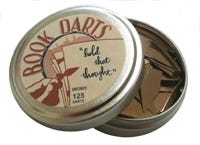
125 count tin of Book Darts, from the Book Dart website First Folio Postcards by Louisa Hare: Louisa Hare is an artist and printmaker who grew up only a few miles from Stratford-upon-Avon, Shakespeare’s birthplace. While working in an antiquarian bookstore there, she discovered a beautiful reproduction of Shakespeare’s First Folio and decided to illustrate it using traditional letterpress printing, a method that has remained much the same since Shakespeare’s time. Their rustic quality is reminiscent of old woodcuts, and I love their different colors and the way they’re paired with expects from Shakespeare’s plays and poems. You can also get a set from the Folger Shakespeare Library.
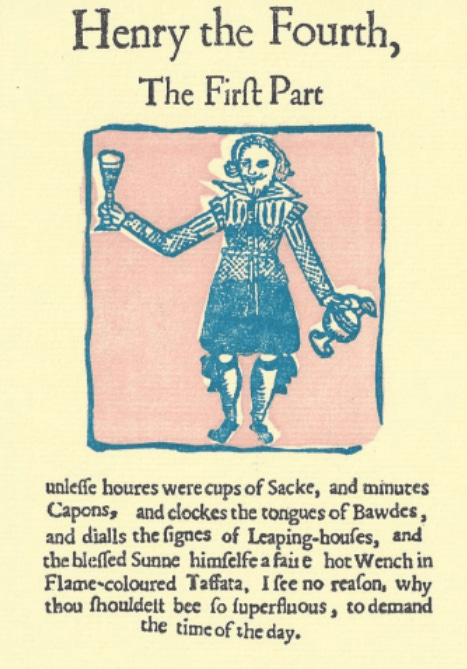
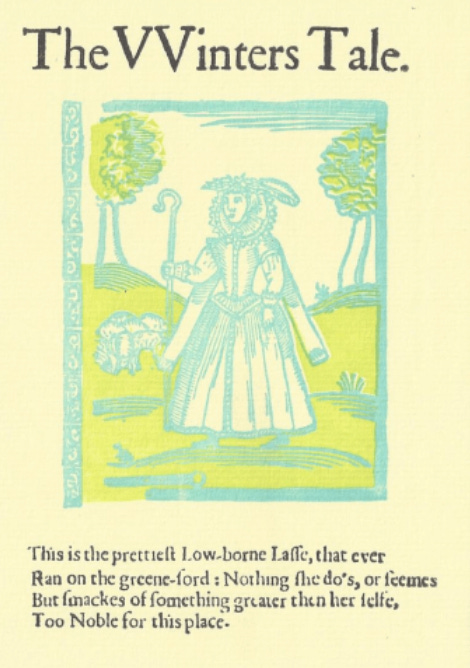
First Folio Postcards by Louisa Hare, images from Folger Shakespeare Library Guipure lace bookmarks: These lace bookmarks come from Bruges, Belgium, where a unique tradition of lacemaking sprung up in the 16th century. Large lacemaking schools were established, giving thousands of poor girls a way to earn a living. By the late 20th century, this number dwindled to a few hundred. Today, fortunately, some younger women seem to be reviving an interest in preserving the lacemaking craft again. I love the delicate beauty of these bookmarks, which are sure to bring joy to any reading experience.


peacock bookmark and lily of the valley bookmark from bruges-shop.com
plus a gift for writers!
Empress Box Writing Paper by Pineider: I couldn’t resist including this ever since I saw it online about a week ago while doing my once-in-6-months search for beautiful stationary sets that I’ll never actually end up buying. Apparently, Francesco Pineider created the first personalized printed letters in Italy, setting up shop in Florence. This letter set, with 24 sheets of paper and 24 matching envelopes, edged in a bright mango color, is so beautifully elegant, and I love the way that the top of the envelope curves and the other three sides are folded in. It would be beautiful to use if one had a fountain pen (I do) and beautiful handwriting (I don’t). But would I ever spend that much on stationery? Maybe if, as the name of the set implies, I were an empress.
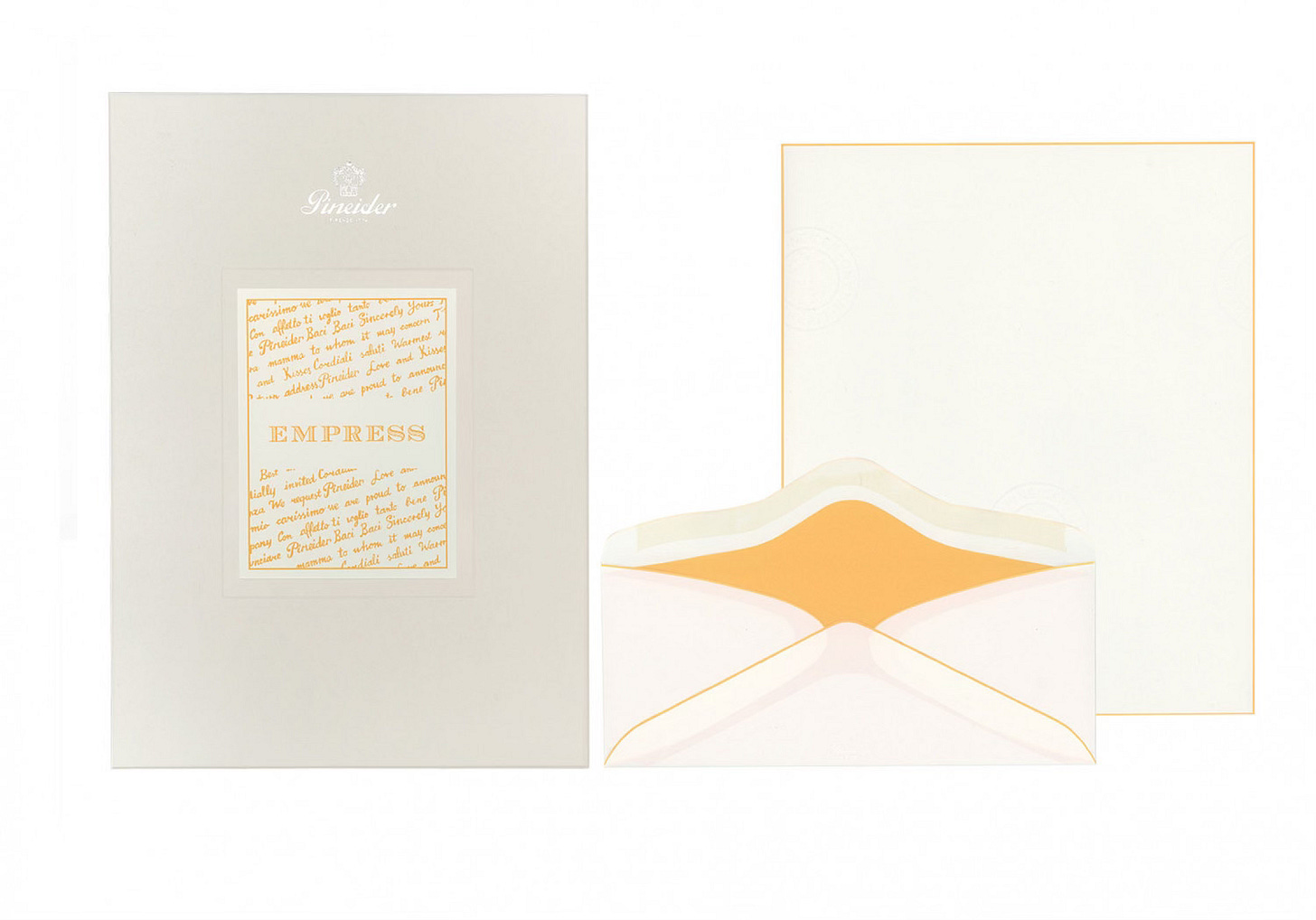
Empress Box Writing Paper by Pineider, from their website
Words of Wisdom
“It is true that we get nothing whatsoever except pleasure from reading; it is true that the wisest of us is unable to say what that pleasure may be. But that pleasure—mysterious, unknown, useless as it is—is enough. That pleasure is so curious, so complex, so immensely fertilising to the mind of anyone who enjoys it, and so wide in its effects, that it would not be in the least surprising to discover, on the day of judgement when secrets are revealed and the obscure is made plain, that the reason why we have grown from pigs to men and woman, and come out from our caves, and dropped our bows and arrows, and sat round the fire and talked and drunk and made merry and given to the poor and helped the sick and made pavements and houses and erected some sort of shelter and society on the waste of the world, is nothing but this: we have loved reading.”
— Virginia Woolf, “How Should One Read a Book?”
In “How Should One Read a Book?” (first given as a speech at Hayes Court Common school in 1926, then published in The Yale Review and later in The Second Common Reader) Virginia Woolf begins with the observation that today we can find books everywhere, we even have special rooms dedicated to them, all kinds of books, and that, easy enough as it is to string together letters, “how are we to teach people so to read Paradise Lost as to see that it is a great poem, or Tess of the D’Urbervilles so as to see that it is a good novel?”
First, we must acknowledge that poetry is different from novels is different from biography. Then, even within a genre, no two authors are the same; we must be charitable, we must leave the judges’ bench and go and stand with the criminal and understand the crimes, as it were, from within the criminal’s mind, for it is by their “uncompromising idiosyncrasy” that the best writers make us put effort into reading them correctly. But if we are now tired of fiction (seeing as “reading is one of the most arduous and exhausting of occupations”), we must refill the tank of the imagination with non-fiction, with fact. Only once our tank is full can we take on the extreme make-believe of poetry.
Then we reach the end of the final page and shut the book. What are we to make of it? Whatever it is we have read, we must put it down, we must go and do something else, we must wait for when “the whole book floats to the top of the mind complete,” and only then must we leave the criminal and “mount the bench” where the judges sit. There we must weigh the book against other books—the best books—of its kind we have read. Only by such reading are “masterpieces… helped into the world.”
As to the question of whether it is profit or pleasure we get from reading, Woolf comes down, at last, on the side of pleasure. Which, as everybody knows, is its own profit.
Poetry Corner
Moððe word fræt. Mē þæt þuhte wrǣtlicu wyrd, þā ic þæt wundor gefrægn, þæt se wyrm forswealg wera gied sumes, þēof in þȳstro, þrymfæstne cwide ond þæs strangan staþol. Stælgiest ne wæs wihte þȳ glēawra, þe hē þām wordum swealg. A moth ate words. To me that seemed a curious event, when I heard about that wonder, that a worm swallowed the speech of some man, a thief in the dark, glorious discourse and its mighty foundation. The thieving visitor was not a whit the wiser when he swallowed those words.
—Exeter Book Riddle 47, my translation
I love Old English riddles, they’re so fun and cheeky and full of wit. Some of them are quite hard to guess, genuine riddles, while others, like this one, have a solution that’s readily apparent but nevertheless delightful simply for the clever and elegant way the poet describes the object. The answer to this one—“bookworm”—doesn’t take much racking of brains, I don’t think. The “worm” here is a moth in its larval stage, and the “mighty foundation” of the “glorious discourse” is, of course, the parchment on which that discourse was written (parchment, made from animal skin, is definitely mightier than the paper most of our books are printed on today).
This riddle comes from the Exeter Book, one of four surviving manuscripts from the 10th century that preserve almost all the Old English poetry we have today. It was donated to the library of the Exeter Cathedral by Leofric, the first bishop of Exeter, in 1072, and, though its cover was used as a cutting board and a beer mat and its last 14 pages burnt at some point, it now seems to live there safely, locked up in a vault.
At the end of the Exeter Book, there is a compilation of about a hundred riddles, many of them inspired by the Aenigmata, a fourth- or fifth-century collection of riddles by the Latin poet Symphosius. However, the Anglo-Saxon riddles don’t merely translate the Latin ones, they expand on them, add detail to them, play around with them, linger on them. Here is the Aenigmata’s precursor to the poem above:
Littera me pavit nec quid sit littera novi: In libris vixi nec sum studiosior inde; Exedi Musas nec adhuc tamen ipsa profeci. Letters fed me, but what letters are, I don’t know: I lived in books, but I am not the more studious for it; I devoured the Muses, but nevertheless I’ve made no headway.
The virtue of the Aenigmata riddle lies it its concision and neat parallelism: X nec Y, “I ate books and yet I’m still a dumb worm,” in three witty variations. What I like about the Exeter riddle is the insertion of the speaker—“To me that seemed… when I heard….” The speaker expresses his own sense of amazement (“a curious event,” “that wonder”) at witnessing this creature worm its way through manuscripts, and the fact that it is not “a whit the wiser” comes as a surprise, a realization, the punchline of a joke.
The “bookworm” could very well be metaphorical. I myself eat so many books, book after book, swallowing down now this person’s speech, now that person’s, gobbling and gulping great heaping spoonfuls of words, straight down the gullet, but, dumb worm that I am, what do I profit?
Beauty Tip
Go to a bookstore, browse a section you normally don’t, and pick a book that seems interesting—but totally out of the ordinary for you!
Lingering Question
What’s your favorite place to read? Or what’s a reading experience (in terms of your reading environment) that’s been particularly memorable for you? I’d love to know in the comments!
—
Dear readers, thank you so much for taking the time to read. If you enjoyed, like this post and subscribe to Soul-Making for more <3





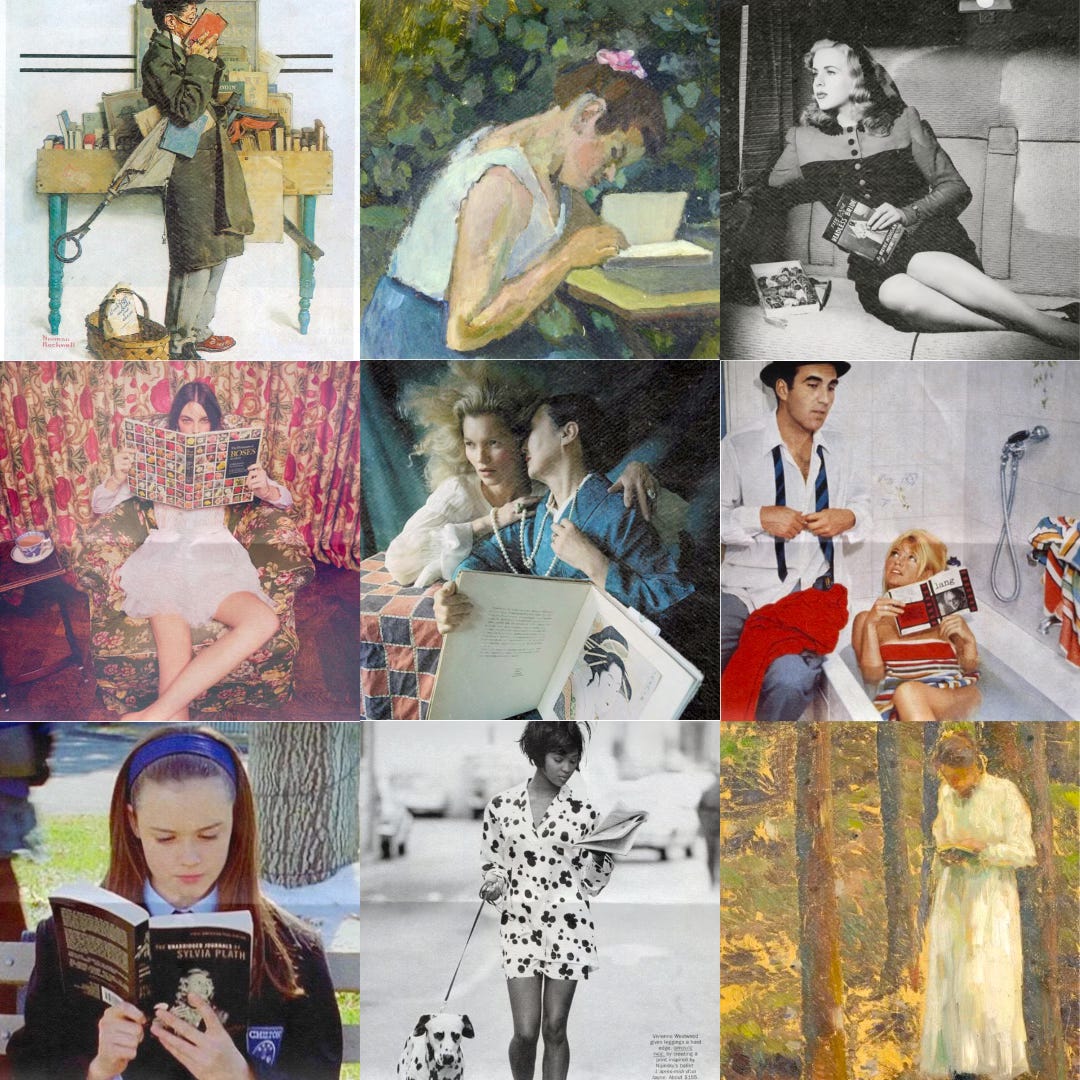
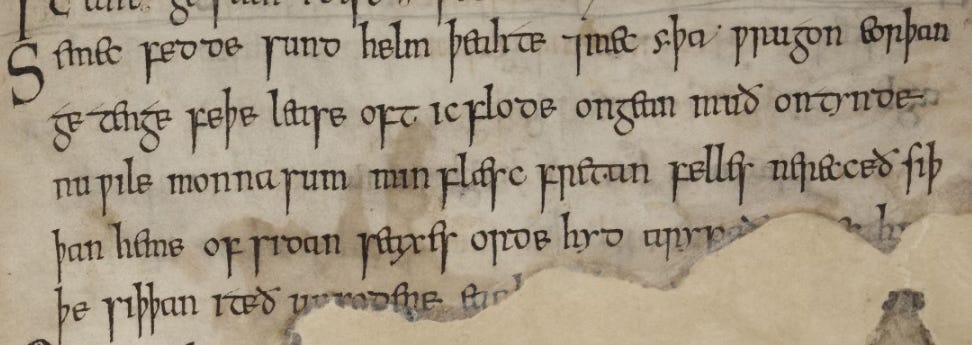
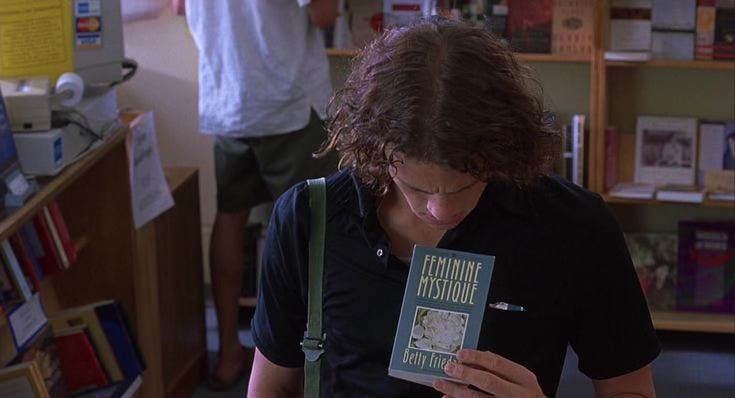
Wow Ramya! another master piece. I love your quote by Virginia woolf. It is nice you are reigniting interest in old English riddles!
"A book should bleed from its pages and infect everything around it"...that's the best line I've read in ages! Loved your whole article,and the lace bookmarks.My fave place to read is an old wooden bench in my little kitchen...I've padded it with a few old quilts and some pillows;like to sit and read with a cup of coffee...my three cats always jump up when I sit there and lay in my lap and on either side of me...my little bubble of happiness for the day or night...